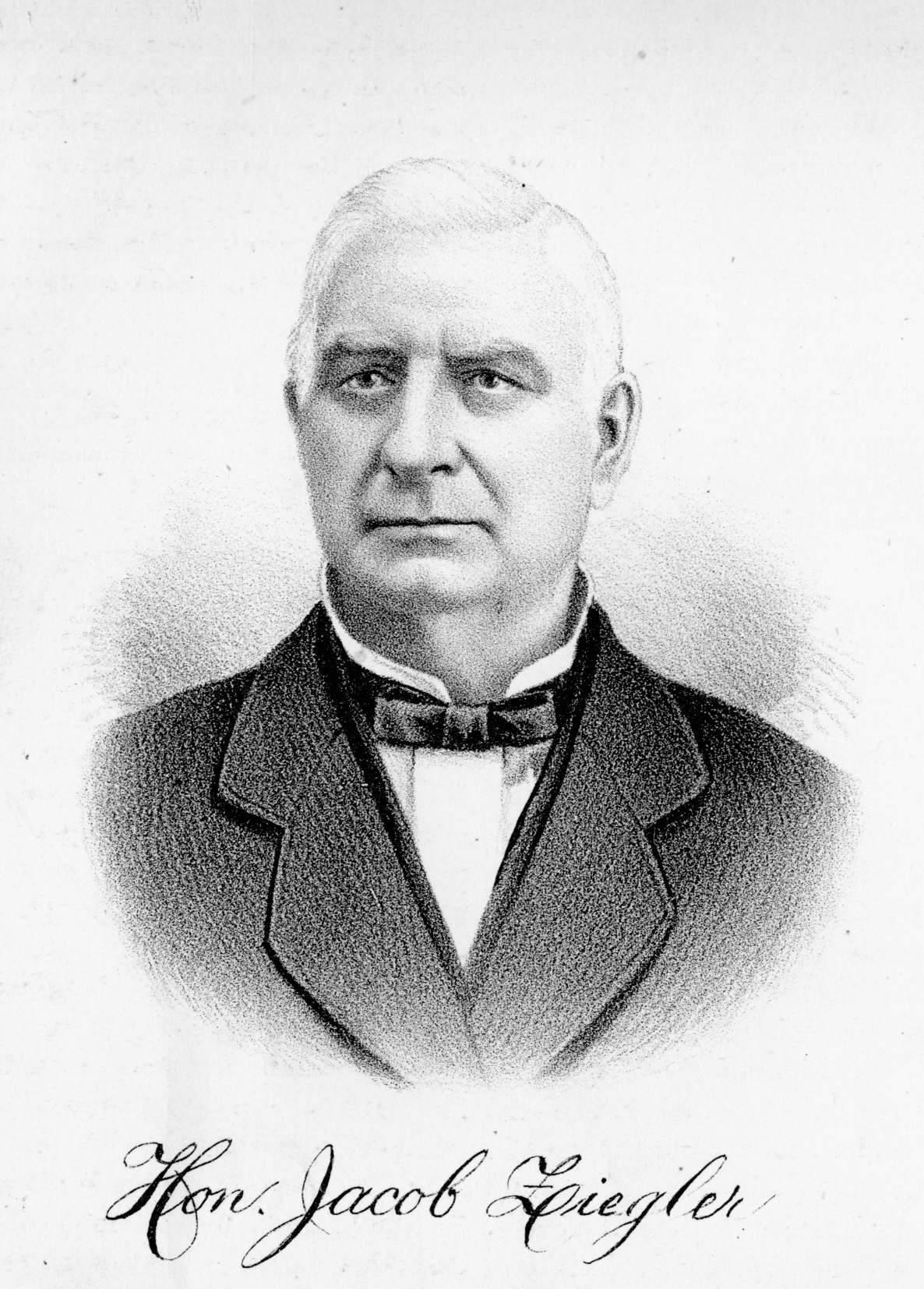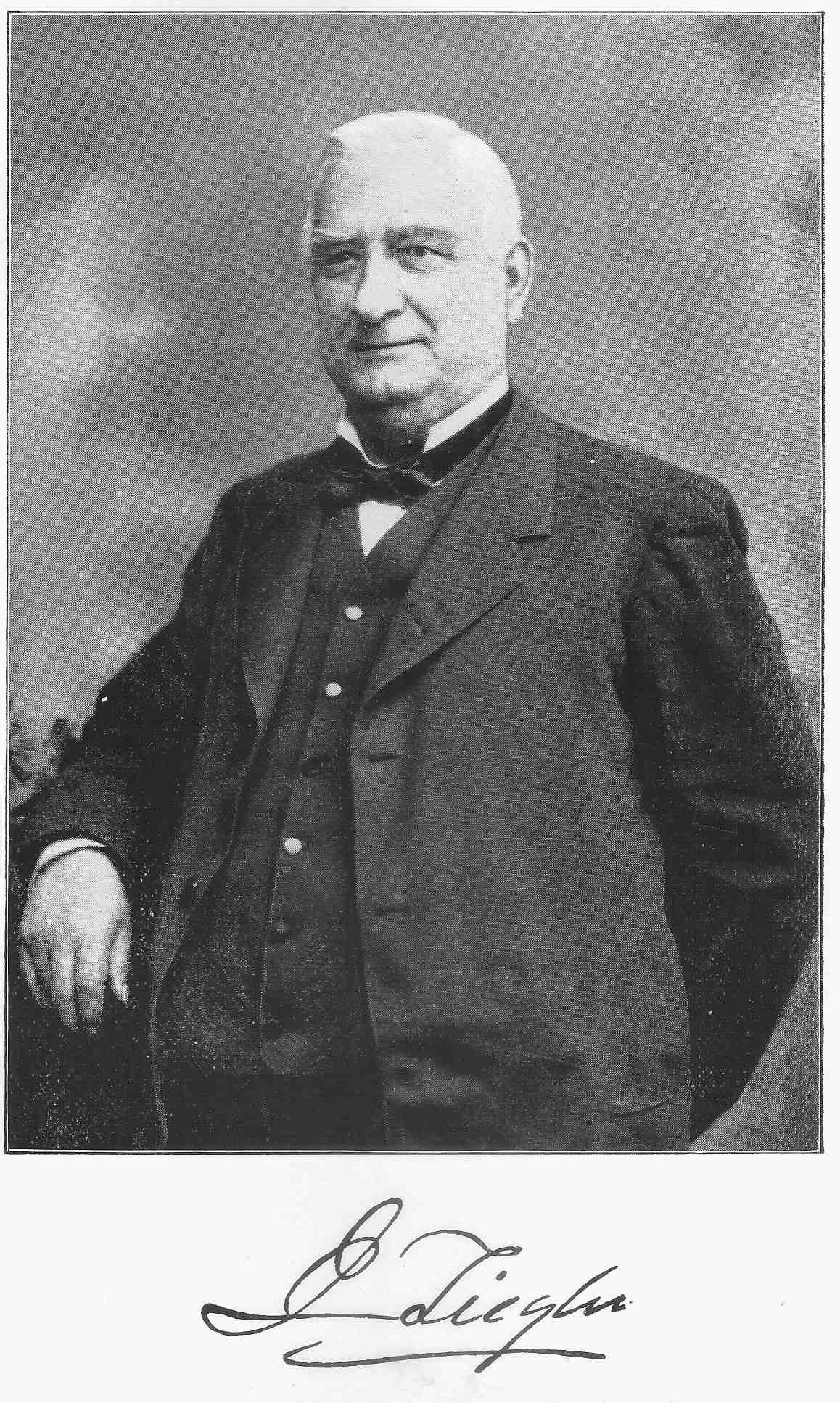Husband Hon. Jacob Ziegler 1

AKA: Capt. Jacob Ziegler 2
Born: 19 Sep 1813 - Gettysburg, Adams Co, PA 2
Christened:
Died: 19 Jun 1888 - Butler, Butler Co, PA 3
Buried:
Father: George Ziegler (1789-1848) 4 5
Mother: Gertrude Elizabeth Chritzman (1792-1865) 6
Marriage: 30 Jun 1835 3

• Additional Image: Hon. Jacob Ziegler.
• Biographical Sketch: from History of Butler County, Pennsylvania (Chicago, IL: Waterman, Watkins & Co., 1883).
To read this brief biographical sketch of his life and career, click here.
Wife Sarah Brinker 7
Born:
Christened:
Died: 13 Mar 1881 3
Buried:
Father: Capt. Abraham Brinker ( -1850) 8 9 10
Mother: Louisa Moser (1799- ) 9 11 12
Children
1 F Amelia Ziegler 3
Born:
Christened:
Died: Bef 1895
Buried:
2 M George W. Ziegler 3
Born: 26 Oct 1838 - Butler, Butler Co, PA 3
Christened:
Died: Aft 1895
Buried:
Spouse: Rachel Shirley ( - ) 3
3 F Julia E. Ziegler 3
Born:
Christened:
Died: Bef 1895
Buried:
4 F Annie L. Ziegler 3
Born: 1842
Christened:
Died: 1927
Buried: - North Cemetery, Butler, Butler Co, PA 13
Spouse: William A. Lowry (1842-1921) 3
5 F Mary A. Ziegler 3
Born:
Christened:
Died: Bef 1895
Buried:
6 M Alfred G. Ziegler 1
Born:
Christened:
Died: Bef 1895
Buried:
7 M Henry Ziegler 1
Born:
Christened:
Died: Bef 1895
Buried:
General Notes: Husband - Hon. Jacob Ziegler
He attended the schools of his native town during his boyhood, or until the removal of the family to a farm some three miles from Gettysburg, where he continued to assist his parents in the necessary work. Finally tiring of agricultural pursuits, he concluded to seek his fortune in a more congenial occupation. Leaving home without his parents' knowledge, with a capital of but one dollar and twelve cents in his pocket, he went to Gettysburg, thence proceeded to Pittsburg, and from the latter city came to Butler, traveling the whole distance afoot and living on the scantiest fare during the journey. He arrived at William Beatty's tavern on the evening of August 21, 1831, with only twelve cents of his capital left. That kind-hearted gentleman, after learning the circumstances, gave him his supper and a night's lodging. During the evening he met David Agnew, an old schoolmate, and the following day he took up his abode at Mr. Agnew's home. About a month later he entered the Repository office for the purpose of learning the printer's trade. James McGlaughlin, one of the editors, asked him to take the place just made vacant by the death of a former apprentice, Neil McBride, and he says: "I agreed to do so on condition that I was to eat at the same table with the family. He said, certainly, but I would find the victuals d-n poor." "The agreement," says Mr. Ziegler, "was written with chalk on the inside of the front door of the office, and was about in these words:"
September, 1831.
Jacob Ziegler came to learn the printing business with McGlaughlin & McClelland. He agrees to stay two years and six months, when he will be free. During that time we agree to furnish him with victuals, clothing and lodging.
McGlaughlin & McClelland. Jacob Ziegler.
He remained faithful to this agreement, served his full time, and continued to work in the office as a journeyman. Some time later his parents, learning of his whereabouts, came to see him, and were so well pleased with his progress and good record that his father purchased him an interest in the office. In May, 1842, he became one of the proprietors of the Herald, with which he was connected a few years at that period. His name is inseparably linked with that paper, which in later years was known far and wide as "Ziegler's Herald."
In the meantime he became quite prominent in public affairs, and began to wield a great influence in the councils of the Democratic party. From 1835 to 1838 he served as clerk of the board of county commissioners, and in the latter year he was appointed prothonotary of Butler county by Governor Porter. In October, 1838, he was elected as his own successor, and served three years. During this period he had studied law under Hon. John Bredin, was admitted to the bar April 18, 1836, and practiced his profession a few years. In 1843 he was chosen transcribing clerk in the State Senate, served in that capacity for two sessions, and afterwards as assistant clerk of the same body one year. In 1847 he was elected a member of the legislature, served one term, and was then appointed a clerk in the pension department at Washington, D. C. When General Taylor became president, the heads of many Democratic clerks fell under the official ax, and Mr. Ziegler's was one of them. In 1849 he went to California and spent fourteen months in the mines of the Golden State. Returning to Pennsylvania, he was appointed chief clerk in the office of the secretary of the Commonwealth, and served in that capacity during Governor Bigler's administration. He was an assistant clerk in the House in 1857, and chief clerk from 1858 to 1860. In 1861 he was elected chief clerk of the Senate, and served during one session. While acting as chief clerk of the House, Mr. Ziegler wrote a book on parliamentary law, which embraced the rules and laws governing the General Assembly, and various other matters of interest. This work, known as "Ziegler's Manual," was the foundation of what is now "Smull's Legislative Hand Book." He was a recognized authority on parliamentary law, and few men of his time possessed so thorough a knowledge of the rules governing legislative bodies. It may not be generally known that Mr. Ziegler was the originator of the Credit Mobilier, and that from his fertile brain sprung that great plan to raise funds for the construction of the Union Pacific railroad. He, however, made little out of it, while millions were made by other prominent public men who utilized this product of his brain. So wide was his reputation for some years succeeding the Rebellion, that the New York Herald once mentioned his name among the prospective presidential candidates. In 1882 he was again elected to the legislature by the people of Butler county, and was a recognized leader of the Democratic party in the House. Captain Ziegler was a fluent and forcible speaker and a ready and vigorous writer. His speeches were full of pith and point, permeated with a vein of humor, and illustrated by appropriate anecdotes, which he seemed to have always ready for the occasion. He was celebrated as a storyteller, and the life of every social gathering.
His title of captain was derived from his connection with the DeKalb Greys, the crack military company of Butler county prior to the Rebellion. He organized, equipped and drilled this command, and was its leading spirit during its existence. When Sumter was fired on and the flag insulted, Captain Ziegler, seeing no hope of an honorable peace, took a firm stand in defence of the Union. He became a voluntary recruiting officer in raising men for the service, and did all in his power to assist the government during those four long years of civil strife. He served as burgess of Butler several terms, and also in the borough council. In 1867 he again became the owner of the Herald, took his son, Alfred G., into partnership, and continued as an editor and publisher to the time of his death, which occurred at his home in Butler, in the seventy-fifth year of his age. As a distinguished mark of respect, all places of business in Butler were closed during the funeral, and the whole town assumed the appearance of mourning. Honest, kind, generous, helpful, charitable, he died without an enemy. Both in his public career and in his home life, he had won the warmest esteem and friendship of the community. His sterling character endeared him most to those who knew him best, while the affectionate and familiar title of "Uncle Jake," given to him by young and old alike, was but another tribute to his kindness of heart and fatherly bearing from the people among whom he had lived for more than half a century.